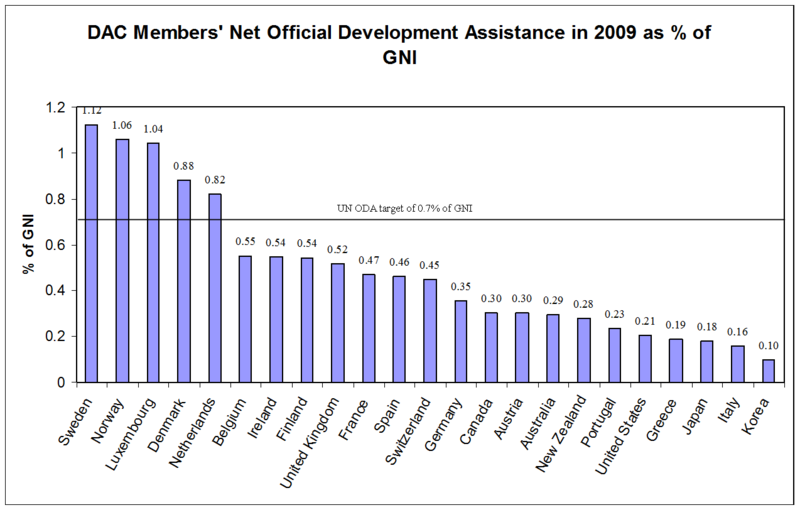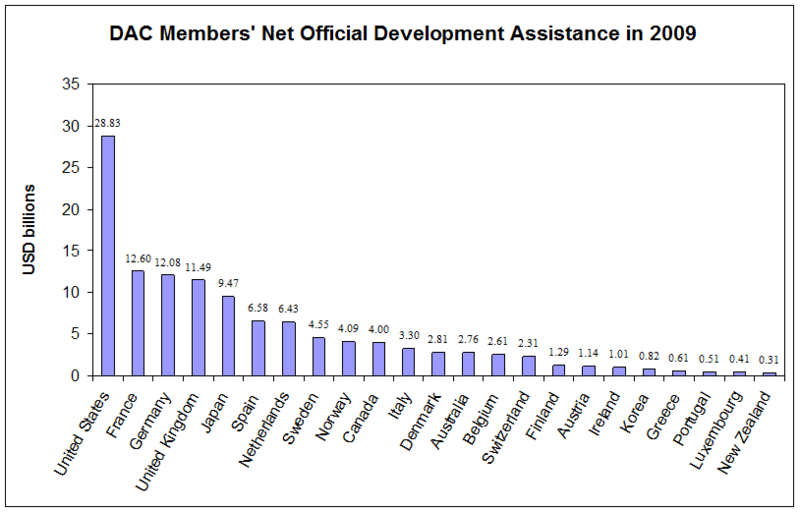Answer: Not that much actually.
In his book, The End of Poverty, Jeffrey Sachs made some careful estimates as to what it would cost to end extreme poverty in the world in about twenty years.
If you are unfamiliar with what the term ‘extreme poverty’ means, check out our piece on defining poverty.
Ending world poverty
To end extreme poverty worldwide in 20 years, Sachs calculated that the total cost per year would be about $175 billion. This represents less than one percent of the combined income of the richest countries in the world.
In fact, this cost is 0.7% of the total income of the 30 countries who comprised the Organisation for Economic Co-operation and Development (OECD) in 2005 when Sachs wrote The End of Poverty. For his calculations, he used the 2002 values for their collective wealth. This is relevant because while there have been some rough economic times since 2002, OECD total income is still somewhat higher now than it was then.

This level of aid has in fact already been promised by the developed nations through the Monterrey Consensus. This consensus guarantees 0.7% of gross national product (GNP) as official development assistance (ODA)1 .
However, fiscal commitments have lagged far behind the agreement. For example, the US only gives 0.18% of GNP as ODA, a much lower value that the Scandinavian countries.
In order for poverty to be ended in the next few decades, the US needs to ramp up to about $75 billion per year in ODA. This would be their contribution if they deliver 0.7% as promised.
The US could end poverty
The United States is spectacularly wealthy. With a GNP in 2009 of about $14 trillion, the US is a huge chunk of the total GNP of the OECD, which is about $40 trillion2 . The sheer size of the US economy means that even though they only give 0.18% of their GNP as ODA, they still give the most total money of any nation on the planet.
US Military spending

The military budget in the USA is about $680 billion per year3 . A large amount of other funding is directly connected to military spending in the states, bringing the total closer to $1 trillion per year4 .Even if we assume the lesser of these numbers, annual defense spending in the US is about four times as much money as is needed to begin rapidly ending extreme poverty in the entire world. If some of the US military’s monstrous budget could be channelled towards humanitarian goals, then extreme poverty in our world could quickly become a thing of the past.
Total US Gov’t spending
In 2011, the US Gov’t will spend about $3.4 trillion. Ending world poverty would require about 5.1% of the current US federal budget.
We certainly acknowledge that the US government is facing problems with their budget recently. To put it bluntly however, their problems are primarily political and ideological rather than monetary. The US economy is gigantic and currently has very low tax levels for many of the richest segments, including corporations and extremely wealthy people. If corporations and the extremely wealthy are made to cough up their fair share, the US will be well on its way to fixing their budget issues.
Bush Tax Cuts
Over the decade from 2010 to 2020, the continuation of the Bush-era tax cuts for only the super-wealthy (who make more then $250,000 per year) will cost about $700 billion. Considering all income levels, these cuts will cost about $3.7 trillion.5 6
Even just repealing the Bush-era tax cut on the extremely wealthy people would pay for about 40% of what is needed to end extreme poverty in the world.
Repealing the entirety of the Bush tax cuts would raise about $370 billion per year, or about twice as much money as would be needed to end world poverty.
It is our hope that the people of the United States take back control of their country from the corporations and the ultra-rich. We then believe that the natural humanitarian inclinations of the American citizenry will then be more free to help the world achieve prosperity.
The United States could become a humanitarian superpower by helping to build the world of tomorrow and sowing deep international goodwill in the process.
- Is it ODA? OECD.org. Accessed August 26th, 2011. [↩]
- OECD Factbook for 2009. Accessed August 25th, 2011. [↩]
- Military budget of the United States. Wikipedia. Accessed August 25th, 2011. [↩]
- Budget breakdown for 2012: Military budget of the United States. Wikipedia. August 25th, 2011. [↩]
- Bush tax cuts: What you need to know. CNN. Accessed August 26th, 2011. [↩]
- Decision Time: The Fiscal Effects of Extending the 2001 and 2003 Tax Cuts. Pew Charitable Trusts. Accessed August 26th, 2011. [↩]
When some of the guys Amazon owner he owns 120 billions is his worth will it hurt some of these ass holes to do for once in their miserable life do some good for the love of God